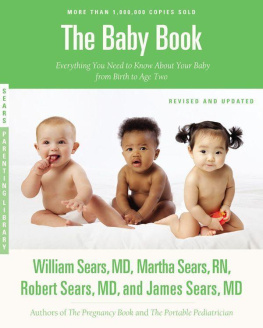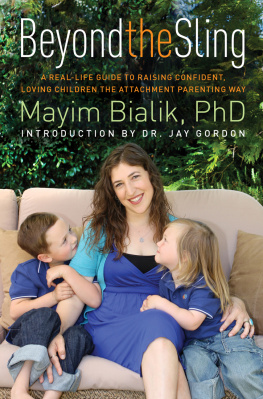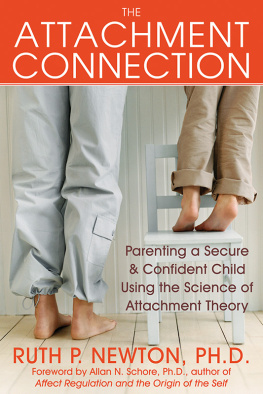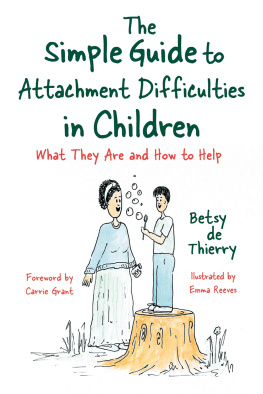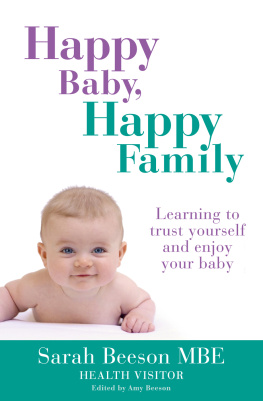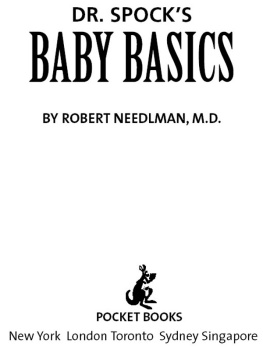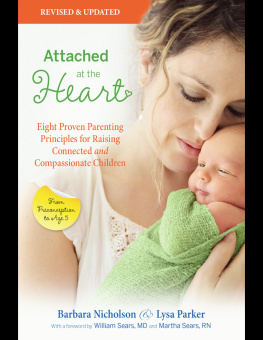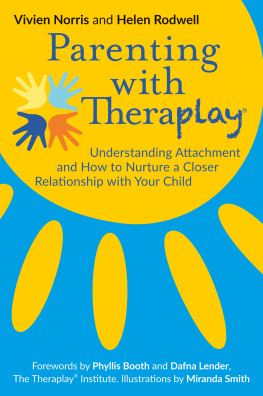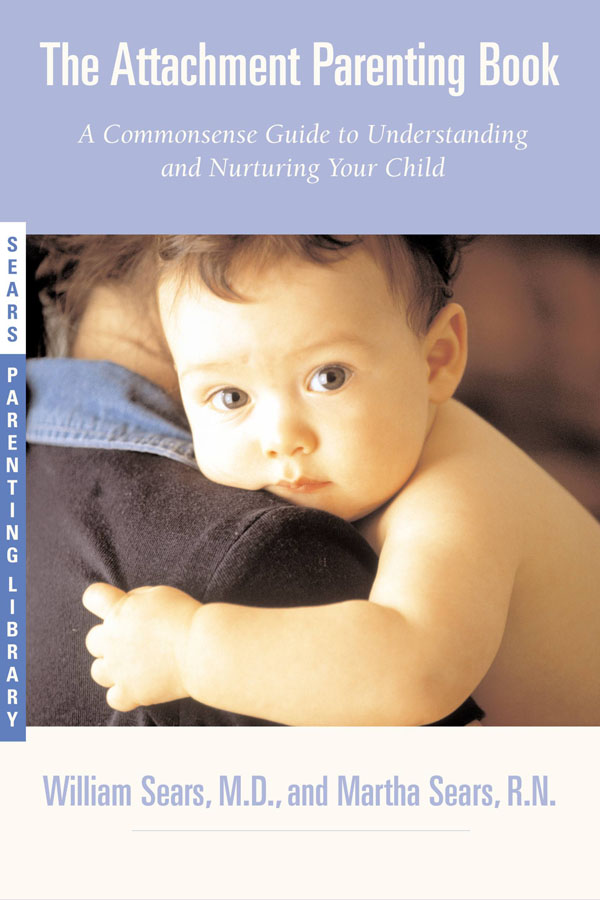COPYRIGHT 2001 BY WILLIAM SEARS AND MARTHA SEARS
All rights reserved. No part of this book may be reproduced in any form or by any electronic or mechanical means, including information storage and retrieval systems, without permission in writing from the publisher, except by a reviewer who may quote brief passages in a review.
First eBook Edition: September 2001
Hachette Book Group,
237 Park Avenue,
New York, NY 10017
Visit our website at www.HachetteBookGroup.com.
ISBN: 978-0-7595-2603-7
The Little, Brown and Company name and logo are trademarks of Hachette Book Group, Inc.
Sears Parenting Library
The Pregnancy Book
The Baby Book
The Birth Book
The Breastfeeding Book
The Fussy Baby Book
The Discipline Book
The Family Nutrition Book
The A.D.D. Book
The Attachment Parenting Book
Parenting.com FAQ books
The First Three Months
How to Get Your Baby to Sleep
Keeping Your Baby Healthy
Feeding the Picky Eater
Sears Childrens Library
Baby on the Way
What Baby Needs
Dedicated to the persons were most attached toour children:
James
Robert
Peter
Hayden
Erin
Matthew
Stephen
Lauren
A LL PARENTS WANT their children to grow up to be kind, affectionate, empathic, well disciplined, and, of course, bright and successful. The ways in which parents help their children develop these qualities differ, since every child is born with a unique personality. The first step in learning how to guide your child is to become an expert in your child. To help you to do this, we will introduce you to a style of parenting called attachment parenting (AP) and a list of helpers we call the Baby Bs.
Our ideas about attachment parenting are based on thirty-plus years of parenting our own eight children and observing moms and dads whose parenting choices seemed to make sense and whose children we liked. We have witnessed the effects this approach to parenting has on children. There is something wonderfully special about these children: they are compassionate, caring, and responsive, and they trust themselves and the people who are close to them. We believe that attachment parenting immunizes children against many of the social and emotional diseases that plague our society. How you parent your children in the early years really does make a difference when it comes to what kind of adults they become. While certainly we cant promise you that attachment parenting will make you perfect parents of perfect children, we can promise you that your children will turn out better than if you hadnt practiced attachment parenting. In addition, attachment parenting will make you a wiser parent and help you enjoy your children more.
Actually, attachment parenting is what most parents would do anyway if they had the confidence and support they needed to follow their own intuitions. In a way, this book is our attempt to give back to parents the instinctual, high-touch way of caring for their children that decades of detachment advice have robbed them of. We are passionate about attachment parenting because for more than three decades we have seen its effects. Its wonderful! It works! Now lets see how it can work for you.
I can read her so well, a new mother proudly exclaimed as she brought her one-month-old infant in for a checkup. She loves to nurse, and I love to watch her.
Everyone tells me what a bright baby I have, said the mother of a cheerful six-month-old who caught my eye and smiled as I listened to his mother. Andrew hardly ever cries. He really doesnt need to.
I saw that look in his eye, and I knew he was headed right for the street, recalled the mother of an almost-two-year-old. I called out, Stop, and Ben instantly turned and looked at me. Maybe he read the alarm in my voice. It made him stop even before I could get to him and pick him up.
My daughter marched off to kindergarten last week, excited and proud to be going to real school, said the relieved mother of a four-year-old. I was concerned because we tried preschool last year and she just wasnt happy there. But now shes more confident, and she seems happy to be on her own for part of the day.
Kriss best friend has been having some trouble getting along with the other kids, said the mother of a fourth-grader. But Kris seems to know how to humor this kid and help him relax and have a good time.
Yes, we trust our daughter with the car on her own (no passengers yet, though), the mother of a sixteen-year-old told me. She knows what kind of behavior we expect of her, and she generally lives up to our expectations.
These are the experiences of attached parents, parents who know their children well and whose children trust them. Parenting seems to come naturally to them, yet they also spend time and energy discovering and paying attention to their childrens needs. These parents got to be attached parents by working at it. They have been rewarded with warm, open, and trusting relationships with their children. Being attached has made parenting easier and more enjoyable.
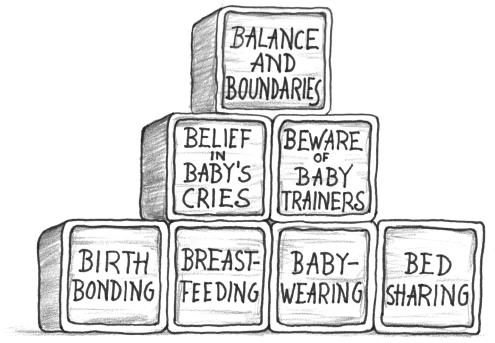
The Baby Bs of attachment parenting.
WHAT IS ATTACHMENT PARENTING?
Attachment parenting is an approach to raising children rather than a strict set of rules. Certain practices are common to AP parents; they tend to breastfeed, hold their babies in their arms a lot, and practice positive discipline, but these are just tools for attachment, not criteria for being certified as an attached parent. So forget the controversies about breast versus bottle, crying it out or not, and which methods of discipline are acceptable, and go back to the basics. Above all, attachment parenting means opening your mind and heart to the individual needs of your baby and letting your knowledge of your child be your guide to making on-the-spot decisions about what works best for both of you. In a nutshell, AP is learning to read the cues of your baby and responding appropriately to those cues.
As youll find out, attachment parenting is not an all-or-nothing approach. Realistically, you may not be able to do everything we recommend all of the time, perhaps because you are working outside the home. This does not mean you cannot be an attached mother or that you cannot use the AP tools effectively. In my pediatrics practice I see mothers of all kinds, from stay-at-home moms to moms who work full-time, and they are able to practice AP quite successfully. In fact, attachment parenting is the ideal parenting choice for working mothers. Building a strong attachment can actually make it easier both to work and to parent your baby. In chapter 11, we offer tips for keeping your attachment strong before and after you return to work.
Babyhood, the beginning of attachment. Raising a child is like taking a trip to a place youve never been. Before your babys birth, you imagine what the journey will be like. You read guidebooks. You plan your itinerary. You listen to friends who have taken this trip. Once your baby is born and youre on the road together, you recognize some of the sights and know some of the highlights. But you also discover that in many ways the place is nothing like the guidebooks described, and at times you seem to be on an altogether different journey. You encounter good weather one day, unsettling storms the next. Sometimes you have lots of fun; other times you feel like catching the next flight home.




